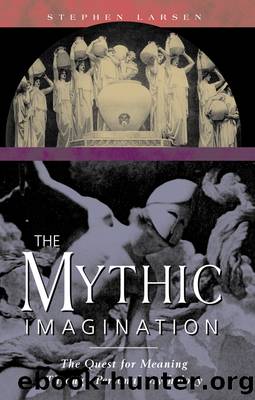The Mythic Imagination by Stephen Larsen

Author:Stephen Larsen
Language: eng
Format: epub
Publisher: Inner Traditions/Bear & Company
Published: 2012-05-26T00:00:00+00:00
FIGURE 23. Other selves: person and persona. (PHOTO BY ROBIN LARSEN.)
The mythic world is âwithinâ in the form of our dreams and visions, but also âwithoutâ when the outer world seems full of archetypal coincidences and we enact our myths (not always to our advantage, as was discussed earlier). In addition, part of the power and privilege of a human being, whether we refer to this as magic or religion, is to control (magic) or to propitiate (religion) the powers of the spiritual realm. The shaman is the prototype of the traveler between worlds and also brings the messages of each to the other (his Hermes-like quality). In possession (which I call âmythic identityâ), however, the shaman does more than travel, and may assume the role of trance medium, embodying, as it were, a spiritual power, and loaning it his human voice box to broadcast the spiritâs message to the human community. Furthermore, in this view, everyone is subject to spiritual invasion, which may result, on the one hand, in physical or mental illness (if the spirits are malevolent, or even rebuking benevolent ones) or, on the other, in the human privilege, as it is conceived, of manifesting a kind of supernatural power, for example, in the possession of oracles by tutelary deities for the sake of prophecy or healing. This is what the Greeks meant by our overused word enthusiasm, literally, âfilled by spirit.â
In the psychology of this ancient model, a human being has no real or fixed identity, but a kind of hollow space or receptivity that may become filled with spiritual or archetypal energy. When a young man going into battle is filled with the numinous power of the bear or the eagle that has come to him in vision, this might be seen as a positive possession. The legendary prowess of the totem animal, which has become his own, enables him to transcend human fear and frailty. However, when someone becomes obsessed or identified with an animal in a psychotic way (such as certain hebephrenic schizophrenics who think they are chickens, for example), the possession is unhealthy, indeed, because in the process he loses his human autonomy, the ability to choose his own behavior. In traditional societies in these latter cases, some variety of exorcism may be employed, visualized as a kind of spiritual eviction procedure, whereby the unwelcome tenant is magically asked to quit the premises. It is curious to see this ancient (and, most moderns feel, superstitious) belief surfacing in modern cinematic myths such as The Exorcist. People still seem to be toyingâfascinated and horrifiedâwith the ancient myth of possession by an archetypal power.3
Download
This site does not store any files on its server. We only index and link to content provided by other sites. Please contact the content providers to delete copyright contents if any and email us, we'll remove relevant links or contents immediately.
Spare by Prince Harry The Duke of Sussex(5197)
Machine Learning at Scale with H2O by Gregory Keys | David Whiting(4313)
Fairy Tale by Stephen King(3399)
Will by Will Smith(2920)
The Bullet Journal Method by Ryder Carroll(2572)
Hooked: A Dark, Contemporary Romance (Never After Series) by Emily McIntire(2554)
It Starts With Us (It Ends with Us #2) by Colleen Hoover(2367)
Rationality by Steven Pinker(2364)
Can't Hurt Me: Master Your Mind and Defy the Odds - Clean Edition by David Goggins(2341)
Friends, Lovers, and the Big Terrible Thing by Matthew Perry(2230)
The Becoming by Nora Roberts(2202)
Love on the Brain by Ali Hazelwood(2078)
A Short History of War by Jeremy Black(1848)
HBR's 10 Must Reads 2022 by Harvard Business Review(1844)
The Strength In Our Scars by Bianca Sparacino(1843)
A Game of Thrones (The Illustrated Edition) by George R. R. Martin(1745)
Leviathan Falls (The Expanse Book 9) by James S. A. Corey(1744)
515945210 by Unknown(1667)
Bewilderment by Richard Powers(1620)
